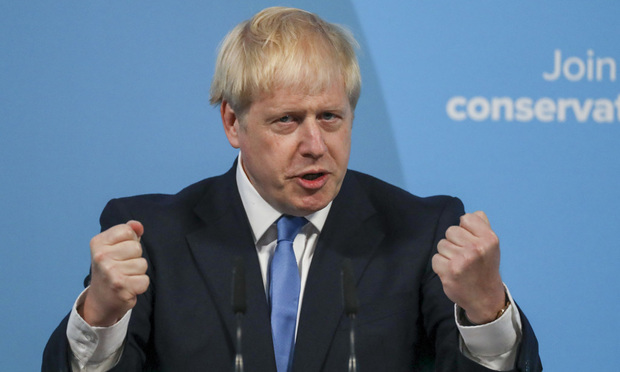Boris Johnson Elected: What Do UK Lawyers Think?
As Boris Johnson prepares to enter 10 Downing Street, top partners from the likes of Freshfields, Macfarlanes, Ashurst, CMS and Eversheds give their thoughts.
July 23, 2019 at 09:46 AM
7 minute read
 Boris Johnson is to be the U.K.'s next Prime Minister. Credit: Simon Dawson/Bloomberg.
Boris Johnson is to be the U.K.'s next Prime Minister. Credit: Simon Dawson/Bloomberg.
At a few minutes past noon on Tuesday, Boris Johnson was announced as the new leader of the Conservative Party, defeating rival Jeremy Hunt by securing nearly twice as many votes from party members. But how is his incoming premiership being viewed by the legal sector? Legal Week has garnered reactions from lawyers around the U.K.
Freshfields Bruckhaus Deringer senior partner Edward Braham has high expectations: “Boris was vocal in his support for business during his campaign, and we look forward to working with the new government to secure good outcomes for business and for our economy,” he said.
Sebastian Prichard Jones, senior partner elect at Macfarlanes, was also upbeat, saying: “It is good we have certainty as to the leadership. Next we need some sort of clarity to the Brexit outcome. We can anticipate some pretty unsettling turbulence now, but it feels like we are at last approaching an endgame and irrespective of the bumpiness we may experience in getting there, finality is what our clients tell us they want.”
However, others, including Eversheds Sutherland CEO Lee Ranson, feel that Johnson faces “a tough time to take on what is always a tough job”. Ranson adds: “He has already identified 'Unite' as one of his priorities and it will be vital that this truly is a guiding principle if he is to deliver the certainty that business and the country needs to prosper.”
Similarly, David Carter, a corporate partner at Ashurst, says: “My hope is that the seriousness of the situation that the country faces and his obvious desire to be judged well by history means that he will pick the right counsel and get into the detail. Got to have hope…”
In a briefing note last week, Phillip Souta, head of U.K. public policy at Clifford Chance, said: “Renegotiating the Withdrawal Agreement, squaring the circle of the Irish Backstop, and overcoming Parliament's intransigence to date is a formidable trio of challenges, even without Boris' ambitions to be about more than Brexit.”
Souta also suggested that, after many years of uncertainty, “businesses on both sides of the Channel will be hoping Britain's new leader can bring harmony out of discord sooner than later”.
Meanwhile, Pinsents director of public policy Andrew Henderson says the new Prime Minister “faces a daunting challenge in navigating a path to deliver on the 2016 referendum result, while holding together a deeply divided Conservative Party”.
He adds: “Business leaders will be keenly observing the early days of Mr Johnson's premiership for indications as to the type of government he plans to lead and, crucially, the Brexit strategy he now intends to pursue.”
In a similar vein, for CMS infrastructure partner Chris Hallam, whether Johnson's leadership is likely to have a positive impact on business remains to be seen. “Mr Johnson's elevation to Prime Minister is, by any reckoning, a quite extraordinary turnaround for someone whose previous experience of high office – whilst memorable – can hardly be said to have been a triumph.”
Hallam believes that “only time will tell whether he possesses the character, drive and attention to be a successful PM”, adding: “What is certain is that he faces perhaps the biggest challenge any Prime Minister has faced since the Second World War: to somehow resolve Brexit in a way that keeps not only his (predominantly right-wing) party happy, but the (predominantly not right-wing) wider electorate as well.”
But Hogan Lovells public law partner Charles Brasted questions what the leadership overhaul actually changes, suggesting that, though there will be an undoubted shift in “face and tone”, there is little change in content.
“We started off with a government position which was 'Brexit means Brexit' and 'no deal is better than a bad deal'. Is anyone now saying anything different from that?” Brasted asks.
“Clearly, Boris has more enthusiasm for [no deal Brexit] than others. But there is not much more than tonal change there,” he adds. “But from our clients' perspective, we can't assume that everything we've done will carry forward. A re-doubling of that engagement is going to be required.”
Other reactions:
Paul Hardy, Brexit director at DLA Piper and former principal legal adviser to the Houses of Parliament, said: “My view is that the chances of no deal are rising but the means by which it happens are still unclear – that's the conundrum of all of this.”
“Boris is still confronted by the same arithmetic calculations in parliament as May. Ultimately it takes two sides to have a no deal. If the EU doesn't extend the deadline, it doesn't matter if he prorogues parliament, calls a general election or a second referendum – that is it. From my sources, the EU is not going to lend the UK a helping hand by extending the deadline. Boris will have to ask for an extension. That will be humiliating and could ruin his reputation.”
“My prediction is what will happen will be the same as the last time round at the beginning of the year – the clients who have prepared will be asking when to trigger their contingency plan, and then there will be those who want a second pair of eyes on their Brexit plan and who come to lawyers for that, and the third, more worrying group, who haven't really begun to prepare in earnest yet. We'll see a spike in panicked requests for legal advice.”
CMS' Chris Hallam added: “As for where [the result] leaves the legal sector, frankly who knows – but I suspect it makes little overall difference to where things currently stand. As with his predecessor, there is no real certainty as to how he will address the issues faced by Brexit, or when (indeed, if) we leave the EU and on what terms – if any. Perhaps the only certainty we should expect is continued uncertainty.
“What's for sure is that a 'no deal' crash out of the EU would, undoubtedly in the short to medium term, be very bad for the U.K. and business confidence – and what's bad for the U.K. and business confidence tends not to be great for the legal sector. If – which must be considered unlikely – but if he can pull off a reasonable deal with the EU, then things should be better. But we'd likely still be in a long period of uncertainty as business unwinds and works through whatever that deal means in practice.
“One of Mr Johnson's more memorable utterings – ironically a few years back on his chances of becoming PM – was that it was 'more likely that I will be reincarnated as an olive, locked in a disused fridge and decapitated by a flying frisbee'. Given the political position he has inherited (or, some may argue, created) that quote might be better applied to his chances of making a success of Brexit. I have high hopes, but low expectations.”
James Miller, managing partner, RPC, said: “Irrespective of the result, the important thing now for our clients is to have a period of political and economic stability so that they can plan for the future. Whoever had won the leadership vote, we are unlikely to get that stability until the future relationship with Europe is settled.”
This content has been archived. It is available through our partners, LexisNexis® and Bloomberg Law.
To view this content, please continue to their sites.
Not a Lexis Subscriber?
Subscribe Now
Not a Bloomberg Law Subscriber?
Subscribe Now
NOT FOR REPRINT
© 2025 ALM Global, LLC, All Rights Reserved. Request academic re-use from www.copyright.com. All other uses, submit a request to [email protected]. For more information visit Asset & Logo Licensing.
You Might Like
View All
Does Your Corporate Compliance Program Reasonably Prevent Fraud? New UK Guidance Demands It
11 minute read

KPMG Wants to Provide Legal Services in the US. Now All Eyes Are on Their Big Four Peers

Trending Stories
- 1Court Rejects San Francisco's Challenge to Robotaxi Licenses
- 2'Be Prepared and Practice': Paul Hastings' Michelle Reed Breaks Down Firm's First SEC Cybersecurity Incident Disclosure Report
- 3Lina Khan Gives Up the Gavel After Contentious 4 Years as FTC Chair
- 4Allstate Is Using Cell Phone Data to Raise Prices, Attorney General Claims
- 5Epiq Announces AI Discovery Assistant, Initially Developed by Laer AI, With Help From Sullivan & Cromwell
Who Got The Work
J. Brugh Lower of Gibbons has entered an appearance for industrial equipment supplier Devco Corporation in a pending trademark infringement lawsuit. The suit, accusing the defendant of selling knock-off Graco products, was filed Dec. 18 in New Jersey District Court by Rivkin Radler on behalf of Graco Inc. and Graco Minnesota. The case, assigned to U.S. District Judge Zahid N. Quraishi, is 3:24-cv-11294, Graco Inc. et al v. Devco Corporation.
Who Got The Work
Rebecca Maller-Stein and Kent A. Yalowitz of Arnold & Porter Kaye Scholer have entered their appearances for Hanaco Venture Capital and its executives, Lior Prosor and David Frankel, in a pending securities lawsuit. The action, filed on Dec. 24 in New York Southern District Court by Zell, Aron & Co. on behalf of Goldeneye Advisors, accuses the defendants of negligently and fraudulently managing the plaintiff's $1 million investment. The case, assigned to U.S. District Judge Vernon S. Broderick, is 1:24-cv-09918, Goldeneye Advisors, LLC v. Hanaco Venture Capital, Ltd. et al.
Who Got The Work
Attorneys from A&O Shearman has stepped in as defense counsel for Toronto-Dominion Bank and other defendants in a pending securities class action. The suit, filed Dec. 11 in New York Southern District Court by Bleichmar Fonti & Auld, accuses the defendants of concealing the bank's 'pervasive' deficiencies in regards to its compliance with the Bank Secrecy Act and the quality of its anti-money laundering controls. The case, assigned to U.S. District Judge Arun Subramanian, is 1:24-cv-09445, Gonzalez v. The Toronto-Dominion Bank et al.
Who Got The Work
Crown Castle International, a Pennsylvania company providing shared communications infrastructure, has turned to Luke D. Wolf of Gordon Rees Scully Mansukhani to fend off a pending breach-of-contract lawsuit. The court action, filed Nov. 25 in Michigan Eastern District Court by Hooper Hathaway PC on behalf of The Town Residences LLC, accuses Crown Castle of failing to transfer approximately $30,000 in utility payments from T-Mobile in breach of a roof-top lease and assignment agreement. The case, assigned to U.S. District Judge Susan K. Declercq, is 2:24-cv-13131, The Town Residences LLC v. T-Mobile US, Inc. et al.
Who Got The Work
Wilfred P. Coronato and Daniel M. Schwartz of McCarter & English have stepped in as defense counsel to Electrolux Home Products Inc. in a pending product liability lawsuit. The court action, filed Nov. 26 in New York Eastern District Court by Poulos Lopiccolo PC and Nagel Rice LLP on behalf of David Stern, alleges that the defendant's refrigerators’ drawers and shelving repeatedly break and fall apart within months after purchase. The case, assigned to U.S. District Judge Joan M. Azrack, is 2:24-cv-08204, Stern v. Electrolux Home Products, Inc.
Featured Firms
Law Offices of Gary Martin Hays & Associates, P.C.
(470) 294-1674
Law Offices of Mark E. Salomone
(857) 444-6468
Smith & Hassler
(713) 739-1250








